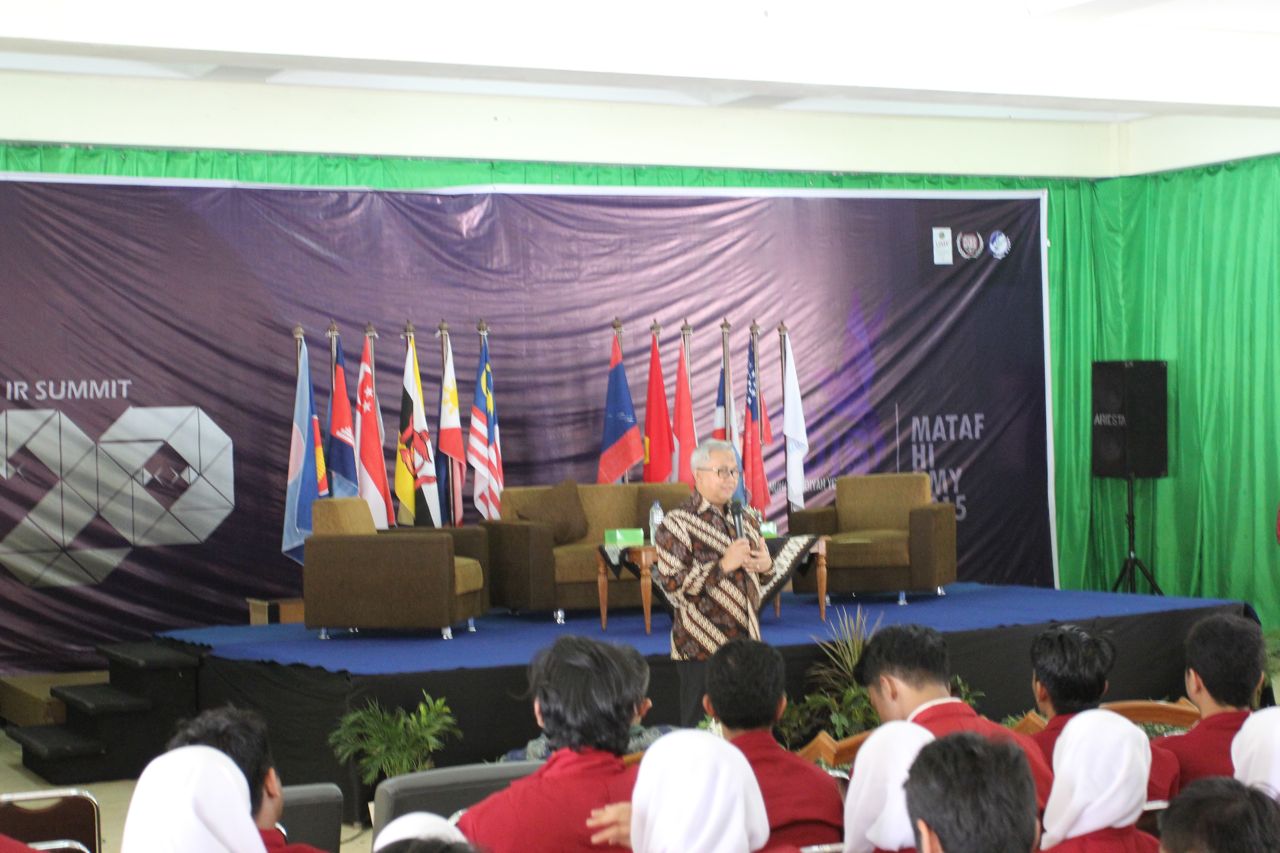One of the duties being a diplomat is making foreign policy which may not be easy. The policy will definitely shift along with the leadership change. For instance, the foreign policy between SBY’s and Jokowi’s era is distinctive. “Noticing operational aspects, the principle in SBY’s era was ‘A Million Friends and Zero Enemies’ while internationalism was in orientation aspects, moderate and tolerance were in approach aspects, and politics and democracy in were issue aspects. In contrast, in Jokowi’s era, ‘Down to Earth Diplomacy’ is in operational aspects, ‘People Oriented’ is in orientation aspects, firm and values are in approach aspects, and marine based democratic economy is in issue aspects. On the other word, SBY’s era was softer since the policy could engage in other countries whereas Jokowi’s era focuses on public interest,” conveyed Salman Al Farisi, a former ambassador of United Arab Emirates as a speaker of ‘Masa Ta’aruf’ (orientation days) of International Relations 2015 on Wednesday (2/9) at Hall of K.H. Dahlan of Universitas Muhammadiyah Yogyakarta (UMY).
He inserted that, even though both are different, they are still applying free-active foreign policy that other nations do not interfere the policy. It should be the emphasis. “I contended that the policy is good or bad since they must have their own goal for this nation. Moreover, the distinction is only in the context so that it does not matter,” he added.
In fact, the policy differences emerged critics from several countries. “Although this nation has implemented free-active foreign policy, critics exist still. Some of them argued that the policy drives Indonesia more introvert, disregarding international interests, as I told that Jokowi’s era concentrates on the citizens,” he asserted.
Several concerns of making foreign policy are aspects of ideology and environment affecting the government. “Ideologically, Indonesia possesses diverse cultures and ethnics bearing Pancasila so that foreign policy making should consider the ideology. The other essential aspect is taking a side of a nation that the country ought to attend to have roles and decide the foreign policy,” he elucidated.
Besides those two aspects, in Jokowi’s era, there are four other aspects to be stressed, namely sovereignty, economic diplomacy, citizen protection, and active participation enhancement. “In the sovereignty, 60% of Indonesia’s areas are ocean so that a policy regarding territorial zone is necessary to maintain the sovereignty,” he affirmed.
In economic diplomacy, a diplomat not only promotes Indonesian cultures but also persuades others to foster the nation development. For instance, Indonesia is now confronting infrastructure reduction so that it is necessary to elevate the economy.
Salma continued that protection of Indonesia people is the other vital aspect, particularly for they who lived overseas. “The diplomat ought to exist in each issue in a country, and be there for them. Thus, when an issue occurs, the diplomat obliges to look for the solution save them. For example, when an earthquake ensued in Nepal, we have to save them. Muhammadiyah Management Disaster itself sent a number of people to assist them and ultimately 26 Indonesian people were safe and went back to Indonesia,” he told.
Furthermore, Indonesia is required to actively engage in international forums. “For instance, Indonesia is included in G20, a community of several countries having the strongest economy in the world. By actively taking part, other countries will acknowledge Indonesia in the participation of other nations’ development,” Salman affirmed.
On the other hand, the more issues happen in several countries, the more barriers prospective diplomats will face. “Being a diplomat is not simple, and has a lot to do. One of them is changing the way of thinking because students’ thought are an input of the nation development. You may start learning nowadays issues. The crux is that’s students have to own curiosity so that we can learns issues occurring in other countries,” he advised.







